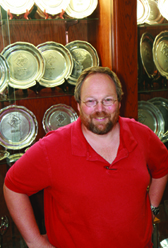Winning habits
Forensics coach Craig Brown has a history of fostering success
Craig Brown, K-State forensics coach, likes to joke that it's his job to turn his students into people.
 It's not that the students who enter the forensics program are unlikable -- Brown would argue that most of them are quite charming. But over the course of a college career, most students change. A lot.
It's not that the students who enter the forensics program are unlikable -- Brown would argue that most of them are quite charming. But over the course of a college career, most students change. A lot.
"I spend a lot of time with them," Brown said. "You're usually traveling almost every weekend together and working during the evening on weeknights. Over the years, they do a lot of growing up. They acquire certain life skills that come with dealing with people from different backgrounds, and in dealing with winning and losing."
Forensics is competitive speaking that consists of three categories: interpretation of literature, such as a prose piece or poem; limited preparation or impromptu speech, in which competitors usually get seven minutes to prepare a three-minute speech; and a memorized speech intended to persuade or inform. Participants are ranked on their abilities throughout the year, with the goal being a top finish at the year-end national tournament.
K-State forensics students are used to winning. The squad placed fourth nationally this year and has placed in the in the top 10 nationally since 1993. But Brown says there's more to a win than acquiring another trophy.
"With winning, it's all about how you handle a win," he said. "It's about not getting complacent and working to do better in the next competition.
"You also have to realize that you're not always going to do well. And, even if you do achieve a win, you still have other aspects of your life that are important -- you still have to do your homework and things for other classes."
Students also have to deal with losing, which Brown said can be really tough for a student who is used to winning. A new student who was a high school forensics standout may not be used to getting critiqued, but it's something they have to learn to deal with to be successful.
Brown is definitely someone students can expect a solid critique from: He's an award-winning forensics participant who has coached at K-State for over 20 years. Under his tutelage the program has consistently ranked well nationally, and he's coached three overall national champions, including this year's national champion, Jessy Ohl.
"I'd like to say that having a national champion is a once-in-a-lifetime achievement, but I've had three in 20-plus years," Brown said. "I've just tended to have really good students. Every six to eight years I have someone who's just phenomenal."
Brown says his coaching style is based on mutual trust and understanding.
"If you want to have a successful program, you have to learn about each person and develop a certain level of trust," he said.
"You figure out each personality and what would work for that person, and which event may play to their strengths. You then give them guidance for the process."
Forensics is distinct from debate, which Brown calls "a one-on-one clash" between two teams taking opposing viewpoints on a contentious issue. That potential for passion boiled over in early August when a Fort Hays State coach mooned an opposing coach during a post-match argument. The coach was fired and the debate team eliminated.
"My attitude is, regardless of why he did it, that is not what we as coaches are supposed to do," Brown said. "I do feel sorry for the debaters. I don't know that cutting the whole program was fair. If I did something wrong, I wouldn't want our program punished."
The K-State forensics program allows students to thrive in an environment that fosters creativity.
Brown and assistant coach Bobby Imbody oversee about 20 students. Older teammates mentor the younger ones and help to instill a sense of pride in the program. After all, no class wants to be known as the one that broke K-State's distinguished winning streak.
"I've always had smart, hard-working students, a great coaching staff and top graduate teaching assistants," Brown said. "The university support we receive is wonderful. This school made a commitment to forensics that a lot of schools haven't.
"At competitions, when some of my colleagues start bemoaning the lack of administrative support at their universities, I can't really say anything. I just have to sit back and be quiet, because the phenomenal university support that we receive helps make the program."